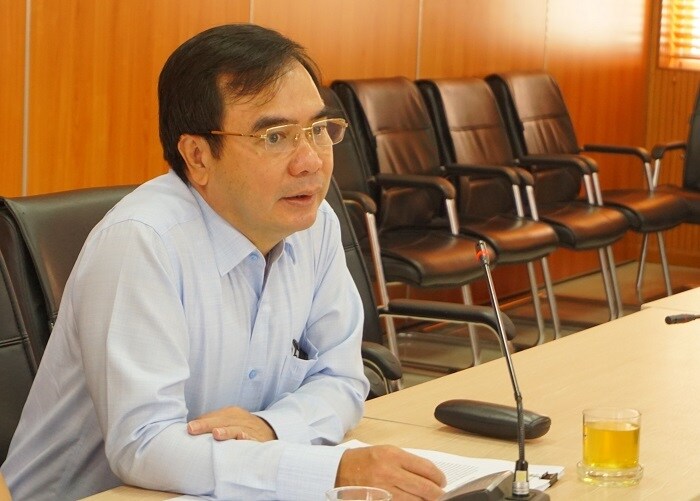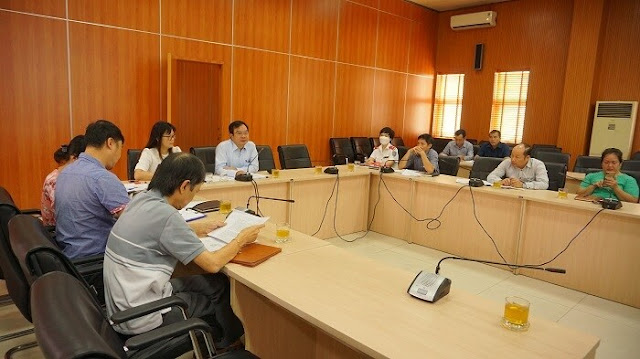Experts believe that it is advisable to accelerate the roadmap in joining the International Convention on Control and Management of Ballast Water and Sediments of Ships.
Join the BWM Convention to protect the environment and human health

“During the research process, the Bureau has presented results, including shortcomings, problems, advantages and disadvantages in joining the Convention, as well as advantages and limitations in affecting rights and obligations of the acceding country as a member”, Deputy Director General Nguyen Hoang shared and expressed his hope that the units and experts would have comments to see if Vietnam accedes to the Convention, what other issues remain. how should be considered.
According to Ms. Tran Thi Tu Anh (Deputy Head of Science, Technology and Environment Department – Vietnam Maritime Administration), as of August 1, 2022, the BWM Convention has received ratifications from 88 countries, reaching 91.20 % of the total tonnage of the fleet world. In addition, Guinea Bissau will officially become a party to the Convention on 12/8/2022 and the UK will officially become a party to the Convention on August 26, 2022. As a rule, the BWM Convention will enter into force 12 months after the date when 30 countries or more with 35% of the total tonnage of the world’s fleet have joined.
The BWM Convention was adopted by the International Maritime Organization (IMO), to prevent the entry of aquatic life into the ballast water environment transported by ships from other seas, affecting the ecology and economy. , human health and strengthen measures to protect the marine environment.
The Convention officially entered into force on September 8, 2017. For existing ships that are not equipped with a ballast water management system, it must be installed at the first IOPP renewal inspection after September 8, 2019.
According to the Vietnam Maritime Administration, with the rapid development of the economy, the number of foreign and domestic ships entering and leaving Vietnam’s seaports is increasing, which means an increase in the amount of waste generated from the operation. construction and operation of seaports, navigational channels and maritime services.
At the same time, there will be an increase in waste generated from the operation of ships such as oil, toxic chemicals, garbage, wastewater, exhaust gas, antifouling paint used for the hull. Especially, the penetration and spread of harmful aquatic organisms and pathogens in the ballast water environment, ballast water residues of ships caused by ships taking ballast water from other waters and discharging them into the marine ecosystem. of Vietnam.
“If not strictly controlled and managed, it will become a great risk and threat to the marine environment, causing great impacts on the marine ecosystem, destroying the marine environment and damaging the marine environment. marine resources, endangering human health,” said Ms. Tu Anh.
Accelerating accession to the BEM Convention

General Secretary of the Vietnam Shipowners Association Bui Van Trung expressed his support for the accession to the Convention. Mr. Trung informed that in the past, joining the Convention was considered because about the past 2-3 years, the market was not favorable, so the installation of the ballast water treatment system affected the business activities of the enterprise. Karma.
Currently, the market has prospered so businesses can install a suitable ballast water management system to improve business efficiency.
Regarding the progress of joining the Convention, Mr. Trung said it was a bit slow. “At this stage, business activities are good, businesses can invest more in ships. At the same time, by joining the Convention, we will have certain advantages. But how to be fair also needs careful preparation from the management agency, “said Trung.
Many units also expressed their agreement of the need to speed up the joining of the Convention. Mr. Hoang Le Vuong, Deputy Head of the Management Board of Crew and Ships of Vietnam National Shipping Lines, informed that all ships that have to install ballast water treatment systems have to be installed. In fact, the Vietnam Maritime Administration has set a roadmap to 2024 to join the Convention, but if pushed early, it will not be affected.
Meanwhile, Mr. Tran Huu Thang, representative of the Registry of Vietnam, said that at present, most Asian and Southeast Asian countries have acceded to the BWM Convention.
If Vietnam wants to go international, it must be equipped according to the prescribed IMO route, otherwise it will limit the market. Most ships that run 100% of international routes will at some point be forced to install the system.
“If you want to protect the ecosystem, biodiversity, and protect the marine environment, it is important to have a tool to control the incoming ballast water, that is, to have a mechanism,” Thang said.
According to the provisions of the BWM Convention on September 8, 2017, all ships operating in the aquatic environment, including submarines, surface ships, floating structures, floating storage facilities are required to:
– Have an approved Ballast Water Management Plan.
– Maintain Ballast Water Log.
Ballast water management on all voyages through a ballast water change operation (or a ballast water treatment operation using an approved ballast water system).
Ships are required to comply with the deadlines for equipping a ballast water treatment system to ensure ballast water is managed on all voyages through the use of this system.
According to traffic newspaper








